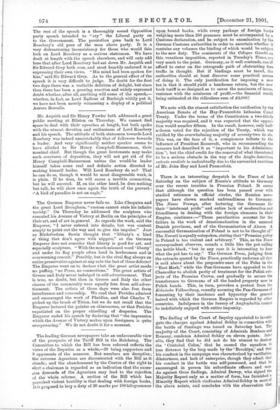The leading German newspapers take an unfavourable view of the
prospects of the Tariff Bill in the Reichstag. The Committee to which the Bill has been referred reflects the views of the Deputies as a whole,-20 being supporters and 8 opponents of the measure. But numbers are deceptive; the extreme Agrarians are discontented with the Bill as it stands; and the abandonment by the Centre of the right to elect a chairman is regarded as an indication that the exces- sive demands of the Agrarians may lead to the rejection of the whole scheme. A section of the Bill which has provoked violent hostility is that dealing with foreign books. It is proposed to levy a duty of 30 marks per 100 kilogrammes upon bound books, while every package of foreign books 'weighing more than 250 grammes must be accompanied by a Customs declaration, and be subject to examination by the German Customs authorities in order to ascertain whether it contains any volumes the binding of which would be subject to the new duty. The comments of the Cologne Gazette on this, vexatious imposition, reported in Tuesday's Times, are very much to the point. Germany, as it well contends, can ill afford to enter on the retrograde path of obstructing free traffic in thought. But if bindings must be taxed, the authorities should at least discover some practical means of doing it. The only justification for imposing a new tax is that it should yield a handsome return, but the new book tariff is so designed as .13 cause the maximum of incon. venience with the minimum of profit,—the financial result being estimated at the ridiculous sum of £4,000!










































 Previous page
Previous page